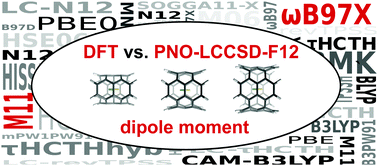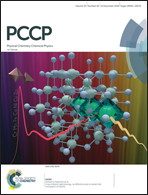Assessment of DFT for endohedral complexes' dipole moment: PNO-LCCSD-F12 as a reference method†
Abstract
We present a systematic evaluation of the performance of a wide range of exchange–correlation functionals and related dispersion correction schemes for the computation of dipole moments of endohedral complexes, formed through the encapsulation of an AB molecule (AB = LiF, HCl) inside carbon nanotubes (CNTs) of different diameter. The consistency and accuracy of (i) generalized gradient approximation, (ii) meta GGA, (iii) global hybrid, and (iv) range-separated hybrid density functionals are assessed. In total, 37 density functionals are tested. The results obtained using the highly accurate pair natural orbitals based explicitly correlated local coupled cluster singles doubles (PNO-LCCSD-F12) method of Werner and co-workers [Schwilk et al., J. Chem. Theory Comput., 2017, 13, 3650; Ma et al., J. Chem. Theory Comput., 2017, 13, 4871] with the aug-cc-pVTZ basis set serve as a reference. The static electric dipole moment is computed via the finite field response or, when possible, as the expectation value of the dipole operator. Among others, it is shown that functionals belonging to the class of range-separated hybrids, provide results closest to the coupled cluster reference data. In particular, the ωB97X as well as the M11 functional may be considered as a promising choice for computing electric properties of noncovalent endohedral complexes. On the other hand, the worst performance was found for the functionals which do not include the Hartree–Fock exchange. The analysis of both the coupled cluster and the DFT results indicates a strong coupling of dispersion and polarization that may also explain why lower level DFT methods, as well as Hartree–Fock and MP2, cannot yield dipole moments beyond a qualitative agreement with the higher order reference data. Interestingly, the much smaller and less systematically constructed basis sets of Pople of moderate size provide results of accuracy at least comparable with the extended Dunning's aug-cc-pVTZ basis set.



 Please wait while we load your content...
Please wait while we load your content...